WWDC 2021 roundup: The biggest news from Apple’s developer keynote
An easy-to-digest rundown of the biggest stories out of this year’s World Wide Developers Conference keynote.
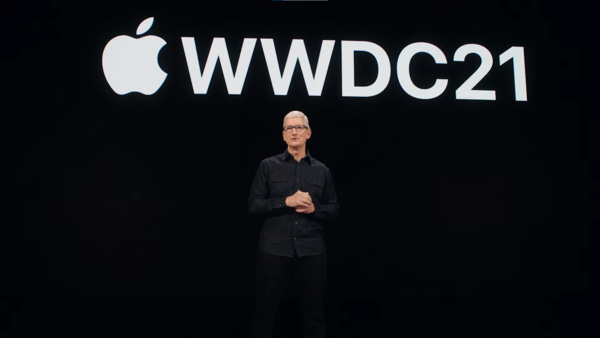
Apple hosted its annual WWDC keynote yesterday, and it was jam-packed with announcements spanning from a new OS for your iPhone to improved privacy for email. There were a lot of announcements jammed into the event’s two-hour runtime, and there’s plenty to talk about.
Here’s a rundown of the biggest announcements from the show.
iOS 15: Huge FaceTime improvements, Focus, and digital IDs
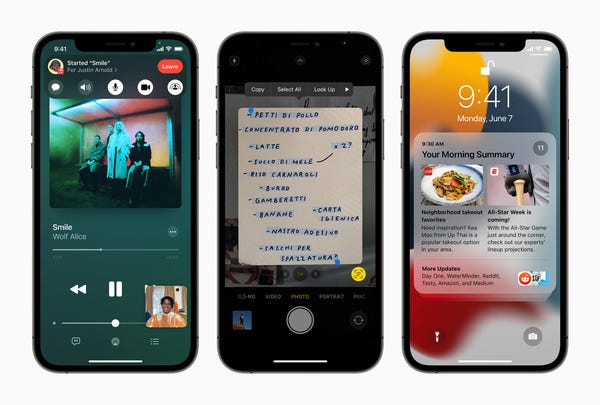
Apple’s new iOS 15 update for your iPhone will ship this fall. It’s in beta now, and it’s got a lot of cool new features. Admittedly, none of them are groundbreaking, but they should help improve the quality of the experience of using an iPhone.
iOS 15 includes many notable upgrades to FaceTime. You now get Spatial Audio support for improved conversations, along with SharePlay which lets you share audible and video content with friends while on a video call. It also has a new grid view for group FaceTime calls that makes it easier to see everyone.
Notifications also get upgraded with a new Focus feature, allowing you to set up profiles and streamline the notifications you want based on which option you select. That also applies to the home screen, letting you see the apps you want when you want (such as apps you only need at work or at home). The look of notifications has also improved.
One feature that’ll surely be talked about a lot is digital IDs. Apple’s Wallet app will now be able to store your ID right on your iPhone, assuming your state lets you do it. The Wallet also gets access to different kinds of keys like house and hotel keys, so expect to be using the Wallet app more often in the future.
iOS 15 also includes improved AI with text recognition in images, Apple Music in Photos for creating videos in Memories, a redesigned Safari interface with extension support, a new Weather app, improvements to Notes, more detailed 3D maps in Apple Maps, and more.
You can read more about iOS 15 here.
iPadOS 15: Better multitasking, widgets on the home screen, and more
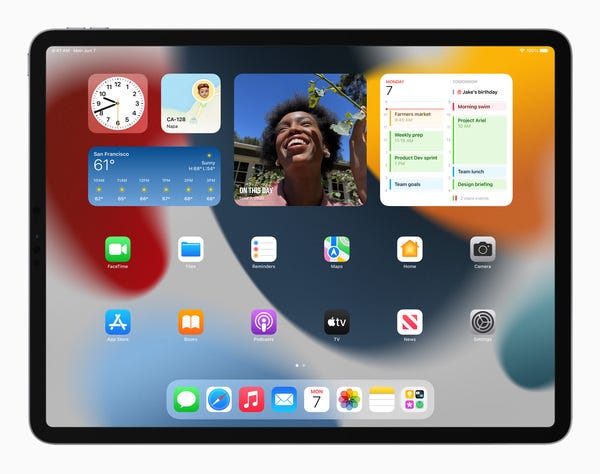
For the iPad, Apple’s iPadOS 15 will bring plenty of new features, many of which can be found in iOS 15 like the FaceTime upgrades and Focus. Apple will lean more into productivity aspects of the tablet with this update thanks to new multitasking features.
You can now tap a button at the top of your screen to enter Split View, and there’s a new way to see all of your apps opened with multiple windows. Taking notes will also be simpler thanks a new swipe-up gesture using the Apple Pencil no matter what you’re doing on your iPad.
Apple is also adding the ability to use your Mac or iPad’s cursor across devices thanks to Universal Control. With the feature, you can move your mouse from your iPad to your Mac as if they were separate monitors. You’ll also be able to develop and deploy apps in Swift Playground right on your iPad, which is really cool.
I’ve got plenty more details on iPadOS 15 here, if you’re interested.
macOS Monterey: SharePlay, Shortcuts, and Universal Control
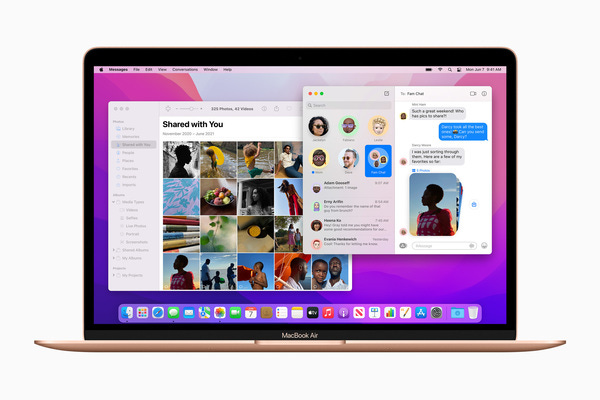
Apple announced macOS Monterey as an incremental update to macOS Mojave, but there are definitely noteworthy features in tow.
Three of the biggest new features include SharePlay, Shortcuts, and Universal Control. SharePlay will let you share media with friends over FaceTime like on iOS and iPadOS, the Shortcuts app from iOS comes to the Mac to eventually replace Automator with more shortcut options and a much more modern experience, and Universal Control lets you use your mouse on your iPad and Mac at once.
That’s not all, obviously. Monterey also gets a redesigned version of Safari, Spatial Audio in FaceTime, improvements to the Notes app, Focus mode, Live Text, an improved Maps app, and improved privacy.
One feature worth highlighting is AirPlay for Mac. Now, you can AirPlay content to your Mac from your iPhone or iPad like you would an AirPlay-equipped speaker or TV. Content will play using your iMac’s built-in speakers and display. You can also use it as a second speaker in a stereo setup with other speakers.
macOS Monterey will support all the Macs that supported Mojave and will ship this fall.
watchOS 8: Mindfulness, a better Wallet, and new workouts
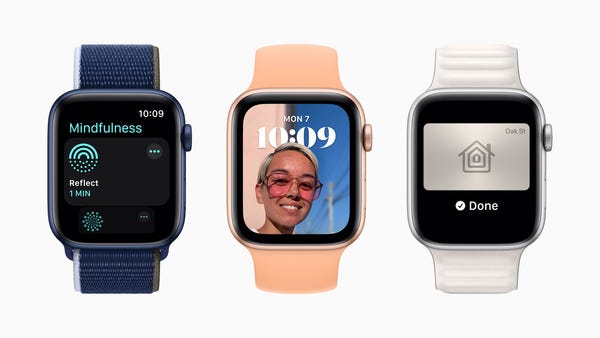
The Apple Watch will see some notable improvement this fall with watchOS 8. Right off the bat, Apple’s rebranding the Breathe app to Mindfulness with an enhanced Breathe experience, a new Reflect session type to help you meditate, and improved animations for a more calming experience.
Also in the health department, Apple is adding sleep respiratory rate to sleep tracking. In Fitness, you’ll be able to partake in two new workouts: Tai Chi and Pilates. watchOS 8 also gets improvements to the Health app like the ability to share your health data with family and friends.
As far as watch faces go, Apple is improving the experience of viewing portrait photos on your Apple Watch by identifying the depth of the photo and having the clock respond accordingly. Apple is also improving the Photos app with a new UI, new ways to communicate through iMessage, improvements to the Contacts app, and Focus mode.
watchOS 8 also gains the ability to handle multiple timers. The always-on display now supports more apps like Maps and Now Playing, and there’s a new Find Items app for finding devices on the Find My network. The Music app has been redesigned, privacy gets boosted, and there’s even picture-in-picture mode for Apple Fitness Plus.
Home: Third-party Siri devices, HomePod, and tvOS
As a part of the improvements Apple’s making to HomeKit, the company will allow third-party companies to add Siri to their devices. This could mean in the future, we’ll be seeing third-party Siri smart speakers and displays.
For now, devices will be limited to things like thermostats. The company showed off an Ecobee thermostat with Siri active on it on-stage. In addition, Siri and HomeKit will support Matter, the name for Project CHIP which will help integrate the smart home ecosystems of other companies like Amazon and Google.
Also in the home department are improvements to HomePod and tvOS. This fall, Apple will let you use your HomePod mini as a speaker for your Apple TV, and you’ll even be able to pair multiple together for stereo sound. Meanwhile, tvOS 15 will bring SharePlay to Apple TV, Shared with You content your friends send you, and a “For All of You” list of shows and movies everyone in your house will enjoy.
FaceTime: Coming to Windows and Android… sort of
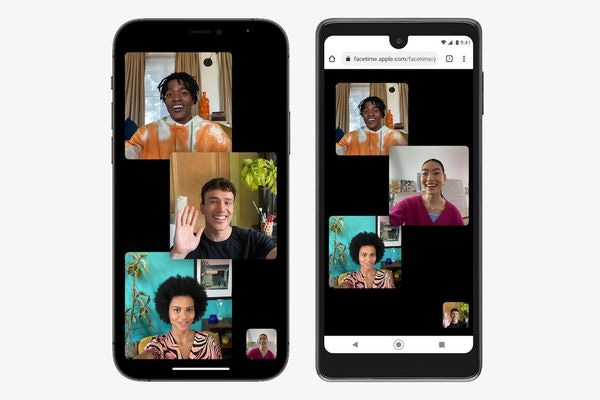
This is about the strangest yet exciting announcement from WWDC: you’ll soon be able to accept FaceTime calls on Windows and Android devices… sort of.
With the new versions of iOS, iPadOS and macOS, Apple will let you share links to FaceTime calls with your friends so they can hop on. These links, Apple says, will be operational within web browsers, which will let you use them in browsers loaded on Windows and Android devices. It’s a workaround to simply not building dedicated apps for those platforms, but at least it’s something.
Apple says every call made through a web browser is end-to-end encrypted, in case you’re wondering.
iCloud Plus: A VPN, better HomeKit video tools, and Hide My Email
For those paying for iCloud storage, you’re getting an upgrade. Soon, Apple will roll out iCloud Plus, its new cloud subscription service which will bundle in a few extra features to make it more appealing.
Private Relay is basically a fancy VPN that takes your web data and sends it through two different relays so no one party can see it, even Apple. The feature will be available on all of your Apple devices, although I’m not sure if it’ll make its way to others.
HomeKit-equipped cameras now get unlimited storage for video.
Hide My Email will let you turn off tracking for companies within emails you receive by having those emails sent to fake addresses. Those emails then get forwarded to your inbox.
Whatever you’re paying right now for iCloud should be enough to get these new features, although Apple doesn’t offer a ton of clarification.
AirPods: Conversation Boost, Find My, and Spatial Audio
AirPods will get new improvements with Apple’s new operating systems. For one, AirPods will gain Conversation Boost, a new accessibility feature for those who are hard of hearing. The microphones inside each earbud will boost voices to make them clearer and easier to understand. You’ll also be able to adjust the transparency of each bud.
Apple will also let you track your AirPods Pro or Max using the Find My app, and the headphones will make a noise so you can find them if you misplace them. The company is also making notification read-outs more powerful so you can, for example, hear a grocery list when you get to the store.
Rounding things off, AirPods Pro and Max will support Spatial Audio on FaceTime and Apple TV 4K.
Xcode Cloud
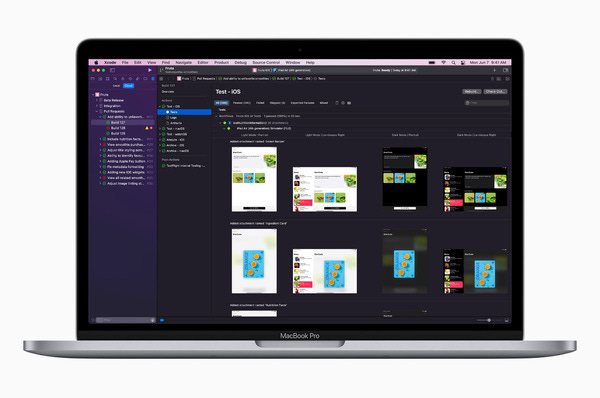
For developers, Apple is introducing Xcode Cloud which will let you test all of your apps right in the cloud without having to run anything on your machine. Here’s how Apple describes the new tool.
Xcode Cloud is a new continuous integration and delivery cloud service designed specifically for Apple developers. Built into Xcode 13, Xcode Cloud offers a fast and simple way for developers and teams of all sizes to build, test, and deliver high-quality apps even more efficiently. Xcode Cloud can automatically build apps in the cloud to free up developers’ Macs for other tasks. Parallel testing in the cloud means developers can test on a simulated version of every current Apple device, then easily deploy a build of the app for internal testing, or deliver to external beta testers through TestFlight for instant feedback.
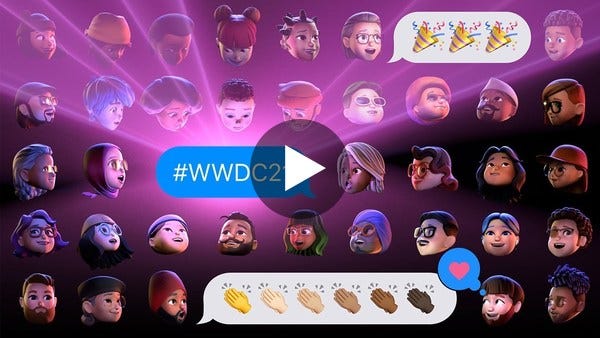
WWDC 2021 — June 7 | Apple
Your personal technology reporter, staying on top of consumer gadgets and apps so you don't have to.
If you don't want these updates anymore, please unsubscribe here.
If you were forwarded this newsletter and you like it, you can subscribe here.
Powered by Revue




